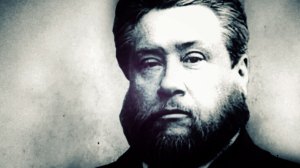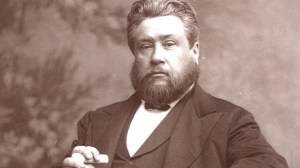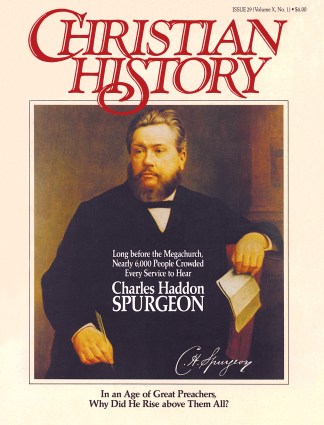In this series
Charles Spurgeon thought through his theology for himself. Taking over ideas he had not sifted and mastered was foreign to him. When Spurgeon reached unconventional conclusions, he did not shrink from implementing them, even when this was quite difficult.
Baptists had a long tradition of ordaining ministers, for example, but Spurgeon managed to get his church to omit this step—he never was ordained. He campaigned arduously to do without the customary title, Reverend, and he eventually succeeded in replacing it with Pastor.
Features of His Theology
Spurgeon considered his objections to ordination and the title Reverend as being scripturally based, a constant feature of his theology. As he put it, “I like to read my Bible so as never to have to blink when I approach a text. I like to have a theology which enables me to read [the Bible] right through from beginning to end, and to say, ‘I am as pleased with that text as I am with the other.’ ”
Next, Spurgeon’s theology was all the more radically biblical for being unsystematic. In the late 1850s he tried to dovetail biblical teaching on human responsibility with his doctrine of election. By 1860 he became convinced it couldn’t be done; something had to yield. Since both doctrines were woven into the fabric of his Bible, however, Spurgeon decided to not sacrifice either. Instead, he sacrificed the possibility of a thoroughly systematic theology.
Spurgeon expressed his approach in a forthright introduction to a sermon on election (no. 303):
“It has been my earnest endeavor ever since I have preached the Word, never to keep back a single doctrine which I believe to be taught of God. It is time that we had done with the old and rusty systems that have so long curbed the freeness of religious speech. The Arminian trembles to go an inch beyond Arminius or Wesley, and many a Calvinist refers to John Gill or John Calvin as any ultimate authority. It is time that the systems were broken up, and that there was sufficient grace in all our hearts to believe everything taught in God’s Word, whether it was taught by either of these men or not.… If God teaches it, it is enough. If it is not in the Word, away with it! Away with it! But if it be in the Word, agreeable or disagreeable, systematic or disorderly, I believe it.”
This was not a momentary conviction. Some years later Spurgeon said, “Angels may, perhaps, be systematic divines; for men it should be enough to follow the Word of God, let its teachings wind as they may.”
Finally, the basic, organizing principle of Spurgeon’s theology was not rational but spiritual. Some of his early published sermons, including Number 1 on the immutability of God, show a philosophical approach. But this disappeared by 1860 (along with his attempts to systematize his theology), leaving the field free for his profound spiritual experience to find deeper expression.
William Robertson Nicoll, an influential Nonconformist newspaper editor who knew Spurgeon’s sermons about as well as anyone, perceptively bracketed Spurgeon with John Bunyan as the two greatest evangelical mystics. Many of the finest passages in Spurgeon’s sermons draw on spiritual exploration into God’s mysteries that his theological mind was unable to map. Robertson Nicoll quoted a memorable example from an 1886 sermon on “The Three Hours’ Darkness”:
“This darkness tells us that the Passion is a great mystery into which we cannot pry. I try to explain it as a substitution, and I feel that where the language of Scripture is explicit, I may and must be explicit too. But yet I feel that the idea of substitution does not cover the whole of the matter, and that no human conception can completely grasp the whole of the dread mystery. It was wrought in darkness because the full, far-reaching meaning and result cannot be beheld of finite mind.
“Tell me the death of the Lord Jesus was a grand example of self-sacrifice—I can see that and much more. Tell me it was a wondrous obedience to the will of God—I can see that and much more. Tell me it was the bearing of what ought to have been borne by myriads of sinners of the human race as the chastisement of their Sin—I can see that, and found my best hope upon it. But do not tell me that this is all that is in the Cross. No, great as this would be, there is much more in the Redeemer’s death. God veiled the Cross in darkness, and in darkness much of its deep meaning lies, not because God would not reveal it, but because we have not capacity to discern it all.”
These adjectives, then—biblical, unsystematic, and spiritual—characterize Spurgeon’s theology.
Coming to Calvinism
What was the content of that theology? It is well known that Spurgeon was a Calvinist. He stood out from the contemporary trend toward abandoning and often denouncing Calvinism. In fact, Spurgeon gave his Calvinism a high profile. When his great, new Metropolitan Tabernacle opened in 1861, a series of sermons was preached on the “five points of Calvinism”—human depravity, election, particular redemption, effectual calling, and final perseverance.
What is not widely known, however, is that Spurgeon’s Calvinism was adopted rather than inherited. He came by it some months after his conversion. As Spurgeon told the story a few years later:
“Born, as all of us are by nature, an Arminian, I still believed the old things I had heard continually from the pulpit and did not see the grace of God. I remember sitting one day in the house of God and hearing a sermon as dry as possible, and as worthless as all such sermons are, when a thought struck my mind—How came I to be converted? I prayed, thought I. Then I thought, How came I to pray? I was induced to pray by reading the Scriptures. How came I to read the Scriptures? Why—I did read them; and what led me to that? And then, in a moment, I saw that God was at the bottom of all, and that he was the author of faith. And then the whole doctrine opened up to me, from which I have not departed.”
Development in His Thinking
It is difficult, however, to trace much development in Spurgeon’s theology. Spurgeon shared the common conservative view that “there is nothing new in theology save that which is false.” When revising his early published sermons, he boasted that though he might alter some expressions, there was no need to change any doctrine. The most change one can observe in his weekly published sermons is that he overcame, by 1860, his early hesitancy about inviting everyone, without distinction, to respond to the gospel.
The reason for Spurgeon’s stability was that he found in the Puritans’ theology ample material to help him fashion his own—although his own Bible study was always his main resource. A fast reader with extraordinary powers of retention, Spurgeon devoured vast quantities of verbose Puritan theology while still a teenager. Partly because of this influence, his theological emphases were different from those of most evangelicals of the period. In the Puritans’ writings, Spurgeon found three things he thought were in short supply in contemporary evangelicalism: rigorous theology, warm spirituality, and down-to-earth practicality.
“The kind of sermons that people need to hear are outgrowths of Scripture,” he told students at his Pastors’ College. “If they do not love to hear them, there is all the more reason why they should be preached to them.”
Topics He Tended to Avoid
Spurgeon’s opinion on the practical relevance of a subject largely determined the amount of attention he devoted to it. Most doctrines passed his “practicality test,” and the doctrines of atonement and Scripture gained especially high marks. But the areas he tended to avoid reveal as much as anything about his theology.
Eschatology, for example, fared badly. His lack of interest is all the more striking since many evangelicals at the time were preoccupied with the doctrine. During the vast majority of Spurgeon’s ministry the return of Christ seemed to him a distant prospect. His initial postmillennial views gave way to premillennialism early on, but he was wary of prophetic passages that acted as a magnet to others. He never felt able to endorse any of the specific premillennial positions then current.
Nor did Spurgeon participate in the holiness movements popular among late nineteenth-century evangelicals. He had a strong doctrine of sanctification, but he was quite scathing about perfectionism: “Though they persuade themselves that their sins are dead, it is … highly probable that the rest of their sins are only keeping out of the way to let their pride have room to develop to ruinous proportions.”
A third area Spurgeon avoided was biblical criticism. He held a straightforward doctrine of biblical infallibility; he had no time for the higher criticism spreading from Germany. Instead of attempting to fight the critics on their ground, however, he steered clear of that entire branch of theological literature. In that, he was probably wise, for he was not really equipped for that battlefield. Spurgeon was not a complete theologian; though his mind had many strengths, it was relatively weak in logic and analysis.
Out of Sympathy with His Age
As a theologian, then, Spurgeon was in many ways out of sympathy with his age. He protested its widespread adoption of liberalism. And his Puritan-inspired Calvinism stood at variance with contemporary evangelicalism.
But in several important respects, Spurgeon was representative of his generation, the English Nonconformists most completely influenced by the Romantic movement. The hallmarks are plainly discernible in him: a desire for reality, life, and spirituality; an impatience with the merely rational; guidance by moral imperatives issued from an authoritative conscience.
Before his conversion, for example, Spurgeon struggled to understand how God could justly remove people’s sin. He had the same difficulty understanding the righteousness of atonement as did the contemporary pioneers of liberalism. Later on, however, Spurgeon defended objective atonement in language as imperiously ethical as any used by its attackers: “I cannot help holding that there must be an atonement before there can be pardon, because my conscience demands it, and my peace depends on it. The little court within my own heart is not satisfied unless some retribution be exacted for dishonour done to God.”
Ultimately, however, in the Down-Grade Controversy [see The Down-Grade Controversy], Spurgeon issued a massive protest against liberalism. The crucial point at which Spurgeon’s path diverged from the liberals’ was not philosophical, methodological, critical, or ethical. It was spiritual.
Nourished by his profound submission to Scripture, Spurgeon deeply appreciated God’s transcendent holiness, the vast gulf separating it from man’s sinfulness, and the atonement that spanned that gulf. He had a truly three-dimensional theology.
Mark Hopkins is lecturer in church history at Theological College of Northern Nigeria.
Copyright © 1991 by the author or Christianity Today/Christian History magazine.Click here for reprint information on Christian History.













